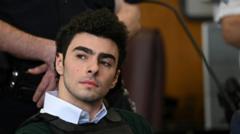Federal prosecutors have escalated their case against Luigi Mangione, seeking the death penalty for the 26-year-old accused of fatally shooting UnitedHealthcare CEO Brian Thompson. This decision comes just ahead of Mangione's plea hearing regarding multiple federal charges, with prosecutors asserting the murder wasn't merely an act of violence, but a calculated attempt to incite ideological opposition to the health insurance sector.
Thompson was shot while arriving at a hotel for a company investors' meeting on December 4. Authorities launched a nationwide manhunt, ultimately arresting Mangione in Pennsylvania days later. While he has pleaded not guilty to state charges, he remains in a New York prison awaiting trial. Attorney General Pam Bondi indicated that the government views this as a premeditated assassination linked to political violence due to Mangione's apparent resentment toward the US healthcare system.
Mangione's lawyer, Karen Friedman Agnifilo, has labeled the push for the death penalty as "barbaric," arguing that it reflects a larger conflict involving state and federal legal systems and the oppressive aspects of the healthcare industry. She believes her client represents a divided populace, caught in a struggle over healthcare ethics.
The prosecution's formal notification argues that Mangione's expressed intentions to attack the healthcare system underscore the likelihood of future harm, framing the murder as indicative of his ideological drive. Should Mangione be convicted on the numerous state charges—including first-degree murder and terrorism—he could face life imprisonment without the possibility of parole. However, the federal charges for murder and interstate stalking elevate his case to the possibility of capital punishment.
The tragic incident has reignited discussions surrounding the contentious nature of the American healthcare system, as many citizens voice their discontent over high costs and perceived mistreatment by insurance companies.

















